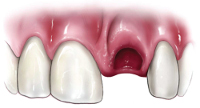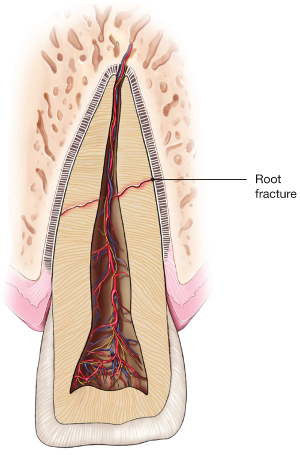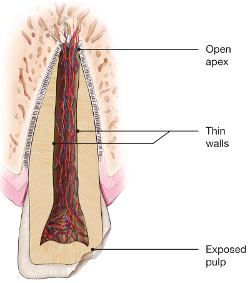MANAGEMENT OF TRAUMATIC INJURIES
Crown Fractures/Root Fractures/Crown-Root Fractures:
Treatment depends on the type of fracture, if its crown fracture with pulp involvement in adult tooth, a root canal treatment would be performed and you would be referred to your dentist to restore the tooth. For some root fractures approximation and flexible splint may be placed for a few weeks. In a developing permanent tooth different treatment options such as revascularization, will be discussed after assessment.
Displaced Teeth (Luxation Injury)
Mild luxation injuries such as concussion and subluxation may occur during sports or minor traumatic incidents, such teeth need to be monitored by your dentist or endodontist. Follow-up is critical as pulp may become necrotic. Some traumatic injuries to the mouth can cause tooth to be moved out of its normal position. It needs to be moved to its original place. Injuries such as intrusion (moved inside the socket), lateral luxation, extrusion (moved out of the socket) etc. have to be assessed and treatments have to be performed depending on the nature of the trauma and stage of the tooth development. It is important to see your general dentist or an endodontist immediately following the injury so the tooth can be repositioned and stabilized with a splint or other procedures can be performed as needed.
Avulsion Injury
If a traumatic injury causes a tooth to be completely knocked out of the mouth, it is important that you see your dentist or endodontist for dental treatment immediately. It is also essential that you protect the tooth from drying out. If possible, gently rinse the root of the tooth with saline, milk or water and put it back into the socket. If you cannot replant the tooth in its socket, you can store the tooth in milk or saline. See your dentist or an endodontist for tooth stabilization with a splint as soon as possible. Ideally your tooth should be replanted back into your mouth within 30 minutes to an hour of traumatic injury. If the tooth is replanted within 30 minutes, or alternatively kept in a physiological solution of specialized media or milk for a few hours, it has a fairly good prognosis. If the tooth has been dry for more than one hour, the periodontal ligament cannot be expected to survive and the tooth will likely become ankylosed. Once the tooth has been reimplanted, most teeth need to be stabilized with a flexible splint for two weeks. Root canal treatment is necessary following an avulsion injury to an adult tooth. In a developing, immature tooth root canal treatment may be avoided. If the tooth is still developing (immature apex) and reimplanted immediately there is a chance that pulp will revascularize.



Dublin Endodontics
6400 Village Parkway Suite 100
Dublin CA 94568
Ph: 925-248-2482 Fax: 925-271-6343
